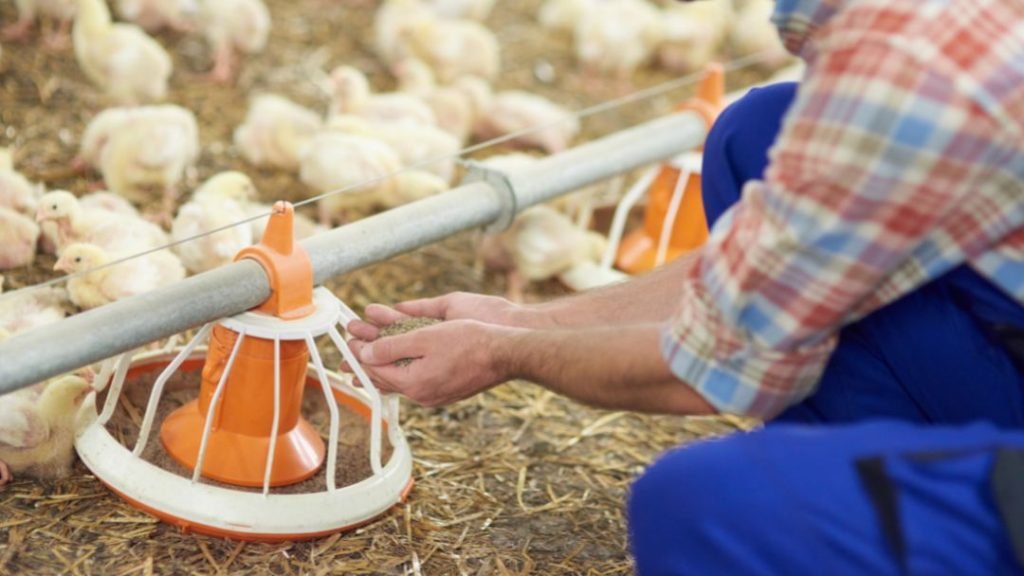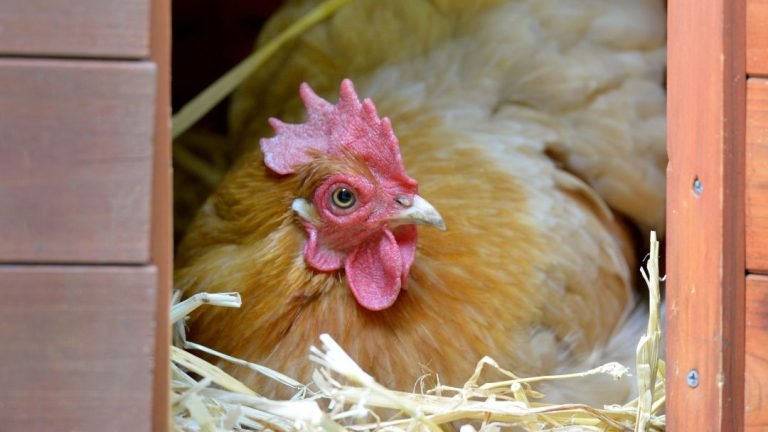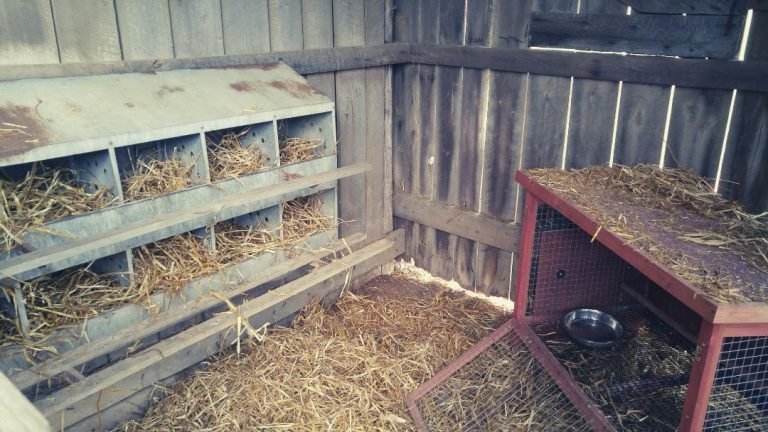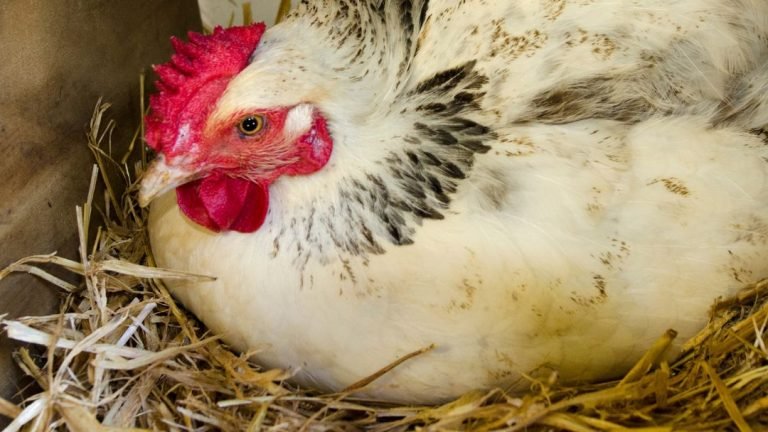Do you know when the first commercial-based chicken feeder was introduced? Many commercial chicken keepers started using chicken feeders in 1938. It has evolved a lot over the years. A well-designed chicken feeder eliminates unwanted messes.
Should I hang my chicken feeder? Hanging chicken feeders protect the feed from dirt, contamination, predators, and moisture. It also prevents chickens from spilling the food and wasting it. But hanged chicken feeders are a bit hassle to refill and clean. Plus, they require more frequent attention as they are off the ground.
Should I Hang My Chicken Feeder?
Hanging chicken feeders appear practical for creating a neat, clean, healthy eating condition.
Here are the top common reasons why you should hang chicken feeders.

01. Less dirt
Keeping chicken feeders on the ground will attract more dirt.
The dust and debris substances from the floor will sit on the chicken feeder. It will affect the food freshness level.
Chickens may not enjoy the food as much as they do with natural, healthy food.
Hanging the chicken feeder above the ground will protect them from floor dirt and dust.
02. Better Control Against Rodents And Other Predators
Chickens feed are favorite among rodents, dogs, skunks, opossums, house cats, foxes, coyotes, snakes, and other predators.
Keeping chicken feeders on the ground will give easy access to chicken food. They will come more frequently if they get an opportunity.
But the food will remain safe when you install the chicken feeder in an elevated position and keep it locked.
They are less likely to steal and create a mess. You will save the feed cost.
03. Less Contamination
Hanged chicken feeders are protected from predators who love to eat chicken food.
Many of these predators carry various diseases. It will contaminate the food.
If your flocks eat them, they will also get affected and become sick. Some may even die.
Besides, chickens are likely to poop more if they are close to the ground. It will also affect the food quality.
Chicken manure may get inside the chicken feed and contaminate it. But it is less likely to happen when they are hanged above the ground.
04. Minimal Food Wastage
Scratching behavior is instinctual in chickens. Keeping the chicken feeder on the ground will give them more chances to do it.
They are likely to throw and spread feed around the feeder. You will have to clean it more frequently.
Also, it will waste a good amount of food and increase the overall monthly feed cost.
But hanged chicken feeders will give flocks less scope to do such a thing.
05. On-time Eating
Keeping the chicken feeder on the ground will invite them to spend more time in the food container.
They may eat even if they are not hungry. Apart from adding extra feeding costs, they will gain too much weight from overeating.
It will cause various types of health issues, such as mobility problems, abnormal habits, pressure sores, and becoming egg-bound.
Hanged chicken feeders will prevent flocks from visiting them repeatedly. They will come to eat when they are hungry.
06. Keep The Feed Dry
Hanging chicken feeders can help to keep the feed dry, especially if they are designed with features that prevent moisture from entering the feeder.
This can be particularly important in areas with high humidity or frequent rain, where ground-level feeders can easily become damp and moldy.
When a chicken feeder is hung off the ground, it is less likely to come into contact with moisture from the ground or surrounding environment.
Additionally, some hanging feeders are designed with covers or lids that protect the feed from rain or other sources of moisture.
Problem With Hanging Chicken Feeders
There are many benefits if you hang the chicken feeders off to the ground.
However, hanged chicken feeders are not problem-free.
There are also some potential downsides to hanging chicken feeders. Let’s figure them out!
01. Difficult To Refill And Clean
Refilling and cleaning chicken feeders off to the ground will be a bit time-consuming and hassle.
It may require using a ladder or other equipment to reach the feeder, which can be time-consuming and potentially dangerous.
Also, hanging feeders can sometimes be more prone to spills or leaks, requiring extra cleaning.
02. More Frequent Attention
Hanging feeders can be more prone to spills, leaks, and damage from weather or pests.
Hence, you need to give more frequent attention to hanged chicken feeders.
Tracking how much food is left is important. Plus, you want to be well aware of whether food is in good condition or gets contaminated.
03. Risk Of Falling
Have you installed the chicken feeder correctly off to the ground?
If the feeder is not securely hung, it may fall and break, potentially injuring chickens or damaging property.
Besides, if the feeder is located in an area with high winds or other adverse weather conditions, it may be more likely to sustain damage.
How Should High The Chicken Feeder Height?
The ideal height for a chicken feeder depends on several factors, such as chicken size, type, and personal preferences.
Most experts recommend placing the feeder at a height that is easy for the chickens to access but not so low that they can scratch and scatter the feed.
If you are growing larger and smaller chickens, ensure the shortest or smallest flocks can easily access them.
Full Sized Chickens
For full-sized chickens, a typical height for a feeder is between 6 and 12 inches off the ground.
This allows the chickens to reach the feed with their beaks easily but keeps the feed off the ground and reduces wastage.
Avoid installing the feeder in a too-high position. Otherwise, birds may have difficulty reaching it and could become frustrated or stressed.
It should not also be too low. They may start scratching and scattering the feed, which can attract pests and cause wastage.
Small Sized Chickens
When growing only smaller chickens or bantams, keep the feeder height at a lower height.
It should be around 3 to 6 inches off the ground based on their height.
This ensures that the chickens can access the feed comfortably without straining their necks or jumping up to reach it.
Inspect Your Chicken Behavior
Ultimately, the best height for a chicken feeder will depend on your specific flock and feeding setup.
It may require some trial and error to find the ideal height.
You want to monitor the chickens’ behavior and adjust the feeder accordingly.
It will ensure better accessibility of the feed without stress.
How To Hang A Chicken Feeder Correctly?
Correctly hanging a chicken feeder is vital to ensure that it is secure, stable, and easily accessible for your chickens.
The following are the steps you want to follow to keep the food container off the ground.
Step 01: Choosing The Right Location
The first important thing is selecting a location for the feeder.
It should be convenient for chicken keepers to access. Plus, the feeder should provide enough space for your chickens to gather around it.
Avoid placing the feeder too close to roosting or nesting areas. Otherwise, it will attract pests and promote unsanitary conditions.
Step 02: Determining The Height
As we mentioned earlier, the feeder’s height will depend on the size of your chickens and the type of feeder you have.
Measure the height from the ground to the bottom of the feeder, and adjust the hanging height as needed.
Step 03: Installing The Hanger
Most chicken feeders come with a built-in hanger or loop for hanging.
If your feeder does not have a hanger, you can purchase one separately from a hardware store.
Choose a sturdy hanger that can support the feeder’s weight when it is full.
Step 04: Securing The Hanger
Use screws or hooks to attach the hanger to a secure structure, such as a post, beam, or tree branch.
Make sure that the hanger is level and that the feeder hangs straight.
Step 05: Filling The Chicken Feeder
Once the feeder is securely hung, fill it with feed, making sure not to overfill it.
Depending on the type of feeder you have, you may need to adjust the flow or settings to prevent spills or waste.
Step 06: Monitoring The Chicken Feeder
Regularly check the feeder to make sure it is functioning properly.
Your feathered friends must be well and have enough feed.
Adjust the hanging height or location as needed to ensure that the chickens can access the feed comfortably.
Wrapping Up
Keeping the chicken feeder elevated provides several benefits, such as reduced waste, improved hygiene, increased accessibility, and better Pest prevention.
If you have various ages of chickens, use several chicken feeders to let them enjoy the food effortlessly. But it is a good idea to hang the chicken feeder in a position that allows small chickens to access it easily.
Younger chickens may not be tall enough to reach a feeder that is hung too high, which can lead to malnourishment or stunted growth. Hopefully, you got a clear idea regarding “How to hang my chicken feeder?”







